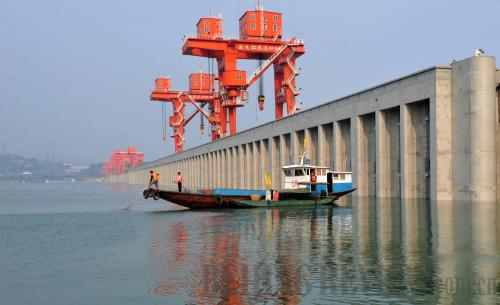|
 |
|
POWER SOURCE: Workers clean floating garbage near the Three Gorges Dam in southwest China's Chongqing on October 24, 2010. On June 19, 2011, the state-owned China Three Gorges Corp. issued its corporate social responsibility report for the first time, pledging to build itself into a world-class clean energy company (HAO TONGQIAN) |
A long way to go
Nevertheless, centrally-administered SOEs' CSR performance still falls short of public expectations.
The CASS report admitted that the overall CSR performance level of the top 100 state-owned enterprises in China is still low, with their CSR development index averaging just 32.8 points. Among these 100 enterprises, only one was rated excellent, 20 good, 21 fairly good and 10 bad, while the CSR performance data of the remaining 47 were unavailable.
Though nearly 20 years has passed since its introduction to China, CSR has not received the attention it deserves, with 70 percent of Chinese enterprises not fulfilling their responsibilities and many SOEs unprepared to take these responsibilities, said the CASS report.
"Centrally-administered SOEs should actively perform their social responsibilities, to stabilize and expand employment, promote energy conservation and emission reductions, and play a model role in maintaining social harmony and stability," said Vice Premier Zhang Dejiang at a meeting attended by heads of centrally-administered SOEs last December.
Zhong Hongwu, Director of the Research Center of Corporate Social Responsibility under the CASS, said that Chinese companies were less motivated to be more responsible for society. "In addition, we lack an established system to press ahead with the process," Zhong said.
The SASAC once launched a thematic study on CSR mechanisms for centrally-administered SOEs. It found few centrally-administered SOEs had set clear CSR strategies and corresponding work plans. According to the research group, it is poor corporate governance that causes the stagnation of their CSR programs.
"Performance management is the basic means of integrating CSR concepts into daily management," said Peng Huagang, Director of the SASAC's Research Bureau. "However, in reality CSR does not take root in Chinese enterprises' operation procedures because they seldom include CSR performance in their personal, unit or department assessment. The aforementioned limitations mean that some centrally-administered SOEs remain in a catch-up stage after three or four years efforts despite an early start in CSR work."
In response, the SASAC has tightened efforts to guide centrally-administered SOEs to turn to a development path with good CSR performance.
In 2008, the SASAC unveiled guidelines on centrally-administered SOEs' CSR work, urging them to establish a CSR management system.
In a 2010 circular, the SASAC required centrally-administered SOEs to honor their social responsibilities and strengthen relevant information disclosure.
From 2006 to 2011, the number of centrally-administered SOEs that released CSR reports increased from five to 76, accounting for about 65 percent of the total 117 centrally-administered enterprises, SASAC statistics show.
According to the China Youth Daily, 92 of 117 centrally-administered SOEs had published their 2011 CSR reports by May 30.
"We will request that all centrally-administered SOEs issue a report on their CSR work in 2012," Peng said.
Li Weiyang, a senior executive with the State Grid Corp., said that the company has understood social cognition and enterprise self-cognition since the release of its first CSR report in 2006.
Li said that besides correct understanding and active institutional innovation associated with CSR, centrally-administered SOEs should attach more importance to strengthening communication with all circles of society and enhance their transparency. "There will be nothing called responsibility if there is no transparency," he said.
Li insisted that transparency is the most important value itself because this is the accumulation of the whole society's social capital. "An enterprise should think about its capability to promote its social values, the content of its transparency strategy, the audience, content and means of its transparency, and the system to achieve its transparency. It requires a joint effort from the whole society," Li said.
In May, the SASAC announced that it would establish a special committee to guide centrally-administered SOEs in fulfilling their social responsibilities. Meanwhile, an evaluation system to judge their performance has also been brought into SASAC's schedule.
"The SASAC will further improve the management system of centrally-administered SOEs' CSR work, guide them to use their advantages to create more value for society, and put them under the supervision of the public," Peng said.
Email us at: yinpumin@bjreview.com | 